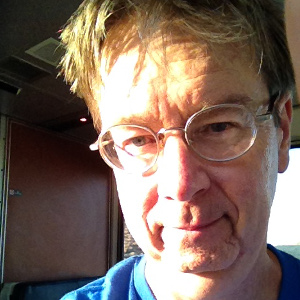Ed. note: You can read Part 1 of John’s essay on Resilience.org here.
Eco Vista and the World in 2025: Taking the Classroom into the Community
The series
Drawing on my own experiences at the University of California, Santa Barbara as a college professor of radical social change for thirty-one years who has been focused on the climate crisis for the past ten, in this three-part series I explore the crisis of higher education with respect to the most pressing existential challenge of the twenty-first century and propose various approaches, actions, activities, and projects for both classroom teachers and networks of educators.
Part One (re-)introduced the UC-CSU NXTerra Knowledge Action Network and the UCSB-developed nearly carbon neutral conference model, which should be of special interest in the Corona Crisis activist and academic worlds as it is a how-to model of a free, no-budget, highly participative, and permanent kind of conference that explodes the weaknesses of the standard model.
Part Two discusses ways of engaging high school and college students in designing and implementing systemic alternatives outside the classroom in their own communities, such as in our case, Eco Vista — the 23,000-member student and non-student community of Isla Vista just adjacent to UC Santa Barbara, among others.
The final part of the series will present a vision of new type of university, exemplified in the world-spanning Ecoversities Alliance, and dreamed of in Transition U and Eco Vista U, two prototypes that I am involved in co-creating with students, staff, faculty, and community members in Santa Barbara, California, and in the Transition US movement.
* * *
There is something frightening about facing new systemic pressures alone, be that challenges with pandemics, conflict, dislocation, trauma, family, mental health, financial meltdown, work, tragedy or a deeper crisis of meaning. For some of us, the old institutions, the old communities, might be a factor in mitigating systemic pressures of making a life in an increasingly complex world work. But for too many people, they are all too alone in their struggle to survive. In this context, what should a young person do? What is the best strategy for equipping yourself for life on a precarious and complex planet? And how best to contribute? – Zaid Hassan, “The University of Full Catastrophe Learning” (May 4, 2020)
A philosophy of teaching and learning
My philosophy and perspective of an educational process graces the syllabi of all my courses, and reads in part:
We are called now to get our hands, hearts, and heads aligned for action in the real world.
Learning and teaching are complex, endlessly fascinating collaborations. I soak up enormous amounts from the students and teaching assistants in my classes, whom I view as colleagues and companions on an intellectual, sometimes life-changing journey. My goals for my classes include the development of critical thinking skills, acquiring the ability to work collaboratively, honing the art of applying theoretical concepts to actual historical, contemporary, and even future situations, and making connections between what we study and how we live.
I consider the educational encounter a radical process, because it contains the potential to change all involved in it, and thereby to contribute, however indirectly, to social change in the world beyond the classroom.
Two of the courses I teach every year now are Sociology/Environmental Studies 130SD: The World in 2050 2025: Systemic Alternatives (the strike through of 2050 was found to be necessary a year or so ago due to the rapidly accelerating pace of the climate crisis) and Sociology 190A: Eco Vista. I taught both in the spring of 2020, entirely on-line, as the corona crisis shut down face-to-face teaching about ten days before the start of the ten-week spring quarter.
They go hand in hand because in the first we explore the pluriverse of systemic alternatives [indeed, we rely heavily on the path-breaking 2019 compendium of systemic alternatives found in Pluriverse: A Post-Development Dictionary, edited by Alberto Acosta, Federico Demaria, Arturo Escobar, Ashish Kothari, and Ariel Salleh], with an eye to thinking through our collective crises to glimpse the values and practices of the various types of worlds we might want to live in as this crucial “decade of decision” unfolds. Doing this in the midst of the corona crisis took us out of any comfort zones we might have enjoyed and reinforced the necessity of collective reflection and work to take the first difficult steps toward those worlds.
The second course is more hands-on. “Eco Vista” was the name chosen in 2017 by a group of students at the University of California, Santa Barbara, acting together with long-time community members to describe their vision of turning their rather unusual community of Isla Vista into an eco-village in the next eight to ten years. Twenty-three thousand people live together in an area of .54 square miles, eighty percent of them between the ages of 18 and 24. In March 2020, the Eco Vista Transition Initiative became the 169th member and the newest link in the Transition US network.
Our aim is to inspire and instigate the foundation of a community with renewable energy, a flourishing and regenerative agro-ecology of public urban gardens, cooperative, affordable eco-housing, a circular eco-economy based on solidarity and meeting the real needs of the inhabitants, radical self-governance and community priorities determined by all who reside here, and to do so within a vibrant web of visionary cultural creativity.
We know that to achieve this aspirational aim will require significant political organization, social movement building, and visionary policy proposals – including the design of and strategy for achieving a systemic alternative – and perhaps even the invention of a new kind of party!
Isla Vista, a 50-year experiment in community built on five centuries of indigenous dispossession in the Americas
The land on which Isla Vista and the adjacent university and city of Santa Barbara sit is indigenous Chumash land, and the crime of their dispossession by white settlers is a history we are acutely aware of, as seen in Sierra Emrick’s film on Eco Vista’s real foundations, Eco Vista: What If (2019). There will be no climate justice in California or anywhere in the Americas until this monumental injustice is overturned by making common cause under the leadership of indigenous and other frontline and fence-line communities everywhere.
Built on this tragedy and sold again in the mid-1950’s and early 60’s by the Regents of the University of California to unscrupulous private landlords with the inception of the UCSB campus, for the past half-century the unincorporated college town of Isla Vista has been a site for radical experiments in alternative ways of living, civil disobedience to authority, community self-governance, and environmental innovation. As an epicenter for both youth culture and intergenerational solidarity, Eco Vista consciously draws on these histories of struggle, which are well narrated in the book Isla Vista: A Citizen’s History, written by Carmen Lodise and a number of other community members who lived there from the 1970s onward.
Today, the community presents many opportunities for active engagement with some of the most critical issues facing U.S. society – food insecurity and injustice, landlord rip-offs, houselessness, and tenant struggles, mental and now physical health epidemics, sexual violence, the closing window for free speech, and the lawlessness of police-community interactions. This is not to mention the too many to list “non-human-oriented examples: ocean pollution/trashing, tree removal instead of tree planting and proper care to reduce ambient temperatures and sequester carbon, encourage avian wildlife, produce food and shelter other beneficial plant-life and especially pollinator insects, etc.” (Maia, personal communication, July 7, 2020)
After a forty-year battle again landlords, college administrators, and the county of Santa Barbara, Isla Vista elected its first local government in late 2017 – the Isla Vista Community Services District. Two years later another referendum empowered this new government to tax utilities, drawing revenue to a $1 million annual budget by 2019. This would soon be followed by an even more surprising development as community interest in carbon-neutrality, just transition, critical ecological post-sustainability, and systems change from below has grown deep roots.
The Eco Vista Project
In 2017, two UCSB undergraduates, Jessica Alvarez Parfrey (now a member of the permanent community) and Valentina Cabrera (who has graduated and moved on to do this work elsewhere) started a project whose goal was to lay the groundwork for an ongoing effort to turn their community, Isla Vista, into a model “eco-village” through a thoughtful bottom-up process of engagement with others.
Over the summer and fall of 2017, the project was named Eco Vista, and activity began. Since then, students and community members, both inside and outside classes on topics such Interdisciplinary Studies 133B, The World in 2050: Systemic Alternatives, What’s Wrong with the World? How Do We Fix It?, and a regular group studies, Sociology 190A called, simply, Eco Vista – have worked in the community on projects around food issues, housing, energy, transportation, local cooperative start-ups, a newsletter/zine, community outreach, and a rich spectrum of cultural creativity. In the fall of 2019 the Environmental Studies/Sociology 134EC class “Earth in Crisis” engaged in a two-week exercise to produce the beginnings of an “Eco Vista Green New Deal” that resulted in a 27-page list of proposals for aligning Isla Vista’s next community development planning process with the most progressive versions of the concept, such as the Red Deal, the U.S. Green Party’s plans, the feminist GND, Bernie Sander’s detailed platform, and ecosocialist ideas [see links to all of these in the Websites section at the end of this essay].
There are now more than 250 people on the Eco Vista e-list, with bi-monthly General Assemblies, which continue to meet on-line during the roller coaster of the corona crisis. There are on-going working groups involved in projects that include a food forest and community gardens, tenants’ rights (including in UCSB housing), prototypes of worker-controlled coops, and more. As we imagine the future, we draw on the precious legacy and ideas of the late resident scholar and activist Michael Bean’s 2020 Eco Vista Sourcebook of imaginative ideas and detailed proposals for bringing about Eco Vista.
Conceptually our efforts are grounded in the latest thinking about Transition Towns, degrowth, buen vivir, just transition, radical climate justice, and the many worlds to be found in the compendium of systemic alternatives Pluriverse: A Post-Development Dictionary (2019). Another approach that guides our thinking and practice is adrienne maree brown’s Emergent Strategy (2017), which counsels working from the bottom up in an inclusive and un-predetermined way to generate collective analyses enabling members to articulate their desires and most sought after outcomes.
Some of this finds expression in the community values we have embraced and our invitation for participation, open to all who agree with them:
Community values and principles
We are inclusive.
We are democratic.
We are non-violent.
We work collectively whenever possible, and all are free to organize their own activities and projects.
We are open to all points of view that are aligned with these values and supportive of the Eco Vista Mission.
We act and live out of love for the dignity of all living beings, and base this love on social and climate justice, and on radical hope.
A Far-Reaching Significance?
We are aiming high: to assist in laying the foundations for the establishment of an ongoing, multigenerational, student-community initiative for an equitable and just transition in Isla Vista, California, and to put the result, Eco Vista, forward as an experiential model that other small towns with college students might want to freely adapt for their communities. We consider what we are trying to do skill-building experiments in sustainable, resilient, participatory development, in a place we call Eco Vista, a very real place and also a timeless, cosmic community of radical visionaries and seekers.
I close with this passage from our mission statement:
In the end, Eco Vista is … a promise, a pledge, a dream, a future.
The promise of Eco Vista is that together we might create a place that is life-affirming for all its inhabitants and that might inspire others elsewhere – particularly young people in their own communities – to use their imaginations to create the innovative future communities we all want to live in, right now!
Our pledge to each other is to co-create, imagine, dream, and transform our community into a place that matches the name of Eco Vista. We want to dream and make manifest this vision together with you!
The Eco Vista dream is a communal, shared, joyful adventure – may it transport us to a place worthy of the love we feel for it.
The future of Eco Vista is … well, that’s what we hope and aim to find out!

References, Part Two
Bean, Michael. 2020. Eco Vista Sourcebook. https://ecovistacommunity.com/eco-vista-project-sourcebook/
brown, adrienne maree. 2017. Emergent Strategy: Shaping Change, Changing Worlds. Oakland: AK Press.
Callahan, Manuel. 2018. “Insurgent Learning and Convivial Research: Universidad de la Tierra, Califas.” Pp. 92-119 in Alessandra Pomarico, editor, and others in the Ecoversities Alliance, Pedagogy, Otherwise: The Reader. Musagetes: artseverywhere. https://ecoversities.org/wp-content/uploads/2018/11/Pedagogy-Otherwise-Reader.pdf
“Eco Vista Green New Deal.” 2019. https://ecovistacommunity.com/eco-vista-green-new-deal/
Emrick, Sierra. 2019. Eco Vista: Imagine If. Film. Salty Sie Productions. https://www.amazon.com/Isla-Vista-Citizens-History-Second/dp/1799247864/ref=sr_1_2?dchild=1&keywords=Isla+Vista+Citizen%27s+History&qid=1587335273&s=books&sr=1-2
Foran, John. 2019a. “Transition U: An invitation to join a global knowledge action network of educators.” September 9, 2019. https://www.resilience.org/stories/2019-09-09/transition-u-an-invitation-to-join-a-global-knowledge-action-network-of-educators/
Kothari, Ashish, Ariel Salleh, Arturo Escobar, Federico Demaria, and Alberto Acosta, editors. 2019. Pluriverse: A Post-Development Dictionary. New York: Columbia University Press and New Delhi: Tulika/AuthorsUpFront. file:///C:/Users/User/Downloads/Pluriverse_A_Post-Development_Dictionar%20(1).pdf
Lodise, Carmen. 2019. Isla Vista: A Citizen’s History. Second Edition. Independently published. https://www.amazon.com/Isla-Vista-Citizens-History-Second/dp/1799247864/ref=sr_1_2?dchild=1&keywords=Isla+Vista+Citizen%27s+History&qid=1587335273&s=books&sr=1-2
Ray, Sarah. 2020. A Field Guide to Climate Anxiety: How to Keep Your Cool on a Warming Planet Berkeley: University of California Press.
Websites
Classes
Sociology/Environmental Studies 130SD: The World in 2050 2025: Systemic Alternatives. https://nxterra.orfaleacenter.ucsb.edu/wp-content/uploads/2020/05/Foran.Syllabus.SOC-130SD.-The-World-in-2050-Sustainable-Development-and-its-Alternatives-UCSB-2020.docx
Interdisciplinary Studies 133B: What’s Wrong with the World? How Do We Fix It? https://nxterra.orfaleacenter.ucsb.edu/wp-content/uploads/2020/04/Foran.Syllabus.INT-133B-Whats-Wrong-With-The-World-and-How-Do-We-Fix-It-UCSB-2019.docx
Soc 190A: Eco Vista.
Websites
Versions of the Green New Deal
An Ecosocialist Green New Deal
https://www.resilience.org/stories/2019-02-11/green-new-deal-an-ecosocialist-study-guide/
A Feminist Green New Deal
http://feministgreennewdeal.com/
Howie Hawkins/Green Party Green New Deal
https://howiehawkins.us/ecosocialist-green-new-deal/
The Red New Deal
Jeremy Brecher, “A Green New Deal for Workers” – 18 Strategies for a Green New Deal: How to Make the Climate Mobilization Work,
https://www.labor4sustainability.org/wp-content/uploads/2019/02/18Strategies.pdf
Bernie Sanders’s Green New Deal
https://berniesanders.com/en/issues/green-new-deal/
Other websites
NXTerra: https://www.nxterra.orfaleacenter.ucsb.edu/
EJ/CJ Hub: http://ejcj.orfaleacenter.ucsb.edu/
Eco Vista Transition Initiative: https://ecovistacommunity.com
Teaser photo credit: Jean–Pierre Hébert, “Scholastica, Cinnabar – II”, 2003 (Courtesy of the artist)






